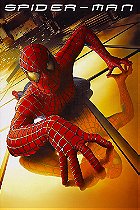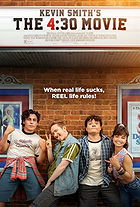The long-gestating big-screen debut of Marvel's most recognisable and iconic superhero, 2002's Spider-Man helped usher in the new contemporary era of comic-book films, establishing a template that continues to influence filmmakers. Like previous successful superhero movies (1978's Superman: The Movie, 1989's Batman), Spider-Man treats the inherently goofy material with utmost sincerity, resulting in an entertaining and thrilling blockbuster that never feels like a self-parody. Additionally, whereas director Bryan Singer banned comic books from the set of X-Men, Spider-Man has a wonderful director in the talented Sam Raimi (Evil Dead 2, A Simple Plan), a massive comic book fan who lets his affection for the source material shine through in every frame. Raimi's adaptation is a film for established comic book fans and newcomers alike, as familiarity with the source material is not a prerequisite. Thrilling on both a visceral and an emotional level, Spider-Man is an action-packed, deeply engaging origin story with hard-hitting poignancy and genuine heart.
In New York City, awkward high school student and keen photographer Peter Parker (Tobey Maguire) visits a university generics laboratory as part of a field trip, accompanying best friend Harry Osborn (James Franco) and his lifelong crush, Mary Jane Watson (Kirsten Dunst), among other students. A genetically engineered spider bites Peter during the trip, and the teen soon realises he has spider-like powers, including enhanced strength, senses and speed, and the ability to shoot webs from his wrists. Peter's sudden behaviour worries his Aunt May (Rosemary Harris) and Uncle Ben (Cliff Robertson), who have cared for the orphan since he lost his parents. When an attempt to earn money as an amateur wrestler ends in tragedy, Peter begins using his abilities to fight crime, hitting the streets of New York City in a distinct red and blue suit as "Spider-Man" to protect the public from criminals. Spider-Man's exploits catch the attention of the media, with Daily Bugle publisher J. Jonah Jameson (J.K. Simmons) hiring Peter as a freelance photographer to supply images of the prolific web-slinger while headlines question if he is a hero or a menace. Meanwhile, Harry's father, Norman (Willem Dafoe), the founder of the Oscorp company, tests a performance-enhancing chemical on himself, but the experiment leaves him mentally unstable. Norman develops an alter ego known as the Green Goblin, who flies around on a glider, wears metallic green armour, and wants to kill Spider-Man.
Since the 1970s, numerous directors and screenwriters tried to tackle Spider-Man, with Marvel exploring options to bring their flagship web-slinger to the big screen and eventually selling the film rights to The Cannon Group in 1985 (for a pittance). Most notably, James Cameron began developing a version in the early 1990s with Leonardo DiCaprio as Peter Parker before lawsuits stalled the production, compelling Cameron to move onto Titanic. Retaining some of Cameron's ideas (including the story's structure and Peter's organic web-shooters), screenwriter David Koepp (Jurassic Park) started scripting Spider-Man when the project finally began taking shape in the late 1990s, with Scott Rosenberg (Con Air) and Alvin Sargent (Ordinary People) contributing uncredited revisions. Within the feature's two-hour runtime, it adequately fleshes out the origins of both Spider-Man and the Green Goblin while introducing several additional characters, from Aunt May and Uncle Ben to J. Jonah Jameson and Betty Brant (Elizabeth Banks). Wisely, script rewrites removed the character of Doctor Octopus (who later appeared in the sequel) because Raimi felt there was not enough room for a third origin story. Remarkably, the supporting characters feel like an organic part of the story instead of forced additions to provide surface-level fan service. Fortunately, nothing feels rushed or underdone, as Spider-Man finds time for effective and engaging moments of character interaction, with a smattering of witty humour to enhance the picture's entertainment value.
Koepp's script roots Peter's story in his modest home life, finding tremendous heart in the teen's relationship with his caring aunt and uncle, who love him like a son and seek to teach him right and wrong. Spider-Man explores the morality of being a superhero, with Uncle Ben delivering the now-infamous line "With great power comes great responsibility" in one emotionally powerful scene. Norman and Peter's personal relationship, with the scientist treating the teen as a son, adds an interesting dynamic and dimension to the battles, particularly since their identities do not remain a secret throughout the story. Additionally, the film depicts the dire and tragic consequences of Peter's decision to engage in petty, vengeful behaviour by not stopping an armed robber. In most superhero films, the protagonist has already internalised these moral lessons, making it refreshing to see a young hero needing to actually learn, mature, and make mistakes. Spider-Man also touches upon the dichotomy of being a hero, with J. Jonah Jameson portraying the web-slinger as a menace and prompting characters to question whether Spidey is a hero. One particularly uplifting moment occurs during the climax when hundreds of New Yorkers fight back against the Goblin and stand up for Spider-Man.
Commencing with a spectacular, web-themed opening credits sequence set to Danny Elfman's superlative score, Spider-Man is immediately engaging, with these first few minutes confirming that the film is in the right hands. With a generous but not overwhelming $139 million budget, Spider-Man's visuals are remarkable, with the state-of-the-art special effects giving convincing life to the titular web-slinger. Raimi demonstrates incredible dexterity throughout the action scenes, from minor scuttles (Peter standing up to Flash Thompson at school) to the bigger battles, such as Goblin attacking a Unity Day festival and a showdown on the Queensboro Bridge. The set pieces are not mere noise, as Raimi pervades the battles with genuine tension, making viewers question whether or not Spidey will always come out on top. The music also significantly contributes to the film's distinct comic-book flavour. Spider-Man is not Elfman's first superhero outing (he previously scored Tim Burton's Batman movies), making him a top-notch choice to compose this film's atmospheric original score. The music is perfect, underscoring the emotion and excitement, and introducing wonderfully memorable motifs.
With cinematographer Don Burgess (Forrest Gump, Cast Away) capturing the action on 35mm film within authentic sets and locations, the picture carries an agreeable aesthetic - things look tangible and real instead of cartoonish. The Oscar-nominated visual effects are, for the most part, spectacular, demonstrating the possibilities of contemporary big-budget filmmaking. Some shots are slightly dated (Peter initially leaping across rooftops as he tests his abilities looks especially ropey, and Goblin vaporising Oscorp's board of directors looks like something from a B-movie), but Spider-Man still looks better and more convincing than the glut of more recent superhero blockbusters that rely on absurdly unconvincing CGI in almost every shot. Raimi uses digital effects only when necessary and ensures that no shots are completely computer-generated to prevent the picture from feeling like animation, which is a quaint notion in hindsight. Raimi's commitment to practical effects even extends to a now-iconic shot of Peter catching Mary Jane's lunch on a tray, a moment that took a reported 156 takes to accomplish.
Maguire creates a vulnerable, three-dimensional hero with insecurities and weaknesses, making Peter Parker/Spider-Man one of Marvel's most relatable and credible superheroes. When Uncle Ben tries to help his nephew by offering advice, Peter's teenage anger and impatience come off as startlingly genuine, a testament to the actor's nuanced performance. Although Maguire's Spider-Man lacks the smartarse, fast-talking dialogue of the web-slinger from the comics, the character begins finding his confidence to taunt his opponents in amusing ways, and the depiction of the titular hero feels authentic and consistent. Alongside Maguire, Kirsten Dunst is a terrific Mary Jane Watson, delivering an endearing and engaging performance as Peter's long-time romantic interest. Dunst was only 19 years old at the start of filming, making her the only member of the cast who actually looks like a teenager. Maguire and Dunst elevate the unspoken romance between Peter and MJ, conveying a lot through expressions and subtle touches.
Willem Dafoe makes for an indelible and memorable villain, believably creating two distinct sides to the character: the arrogant (but sometimes sympathetic) Norman Osborn and the maniacal Green Goblin. Dafoe chews the scenery with gusto as the Goblin (even singing "Itsy Bitsy Spider" while waiting for Spider-Man), delivering a vibrant and sinister performance that remains iconic. Indeed, there is a reason why Dafoe later reprised the role in 2021's Spider-Man: No Way Home. Another standout is J.K. Simmons, who was born to play J. Jonah Jameson. Fast-talking and witty, Simmons is indispensable as the newspaper publisher, making it impossible to imagine anybody else in the role. It is, therefore, unsurprising that Simmons was invited to play the character in the Marvel Cinematic Universe alongside Tom Holland. Other terrific names fill out the cast, from Rosemary Harris and Cliff Robertson, who are perfect as Aunt May and Uncle Ben, to a young James Franco as Harry Osborn, and even Ted Raimi as a Daily Bugle employee. Spider-Man is also the second Marvel movie to feature Stan Lee in a cameo appearance (after X-Men). Lee later appeared in 2003's Daredevil and Hulk before becoming a Marvel Cinematic Universe mainstay until his passing in 2018.
Spider-Man is not ashamed of its comic book origins as Raimi lets the movie be slightly cheesy at times, with voiceover narration, a campy Bruce Campbell cameo as a wrestling announcer (who coins the term "The Amazing Spider-Man"), Macy Gray performing a live concert, sly humour, and other moments that would look out of place in "dark and gritty" superhero movies. Raimi takes the movie seriously but not too seriously, a tricky balancing act that the filmmaker confidently achieves. Admittedly, a few of Spider-Man's components are too distinctly Hollywood, including the depiction of high school (down to the students who look like they are in their 20s), the decision to kill the main villain, and the script positing that Parker was able to devise and create such an impressive suit. Nevertheless, none of this is enough to meaningfully tarnish the film. A coherent, involving comic-book origin story that delivers action and spectacle, Spider-Man works so well because Raimi never loses sight of the story's human core and ensures there is heart to supplement the blockbuster elements.
8.8/10
 Login
Login
 Home
Home 183 Lists
183 Lists 1673 Reviews
1673 Reviews Collections
Collections




 0 comments,
0 comments, 





























